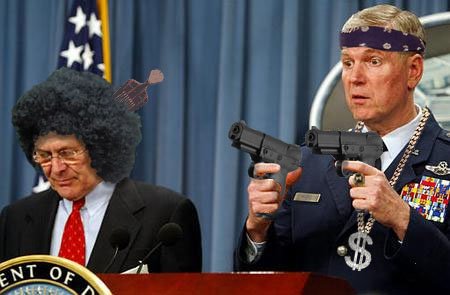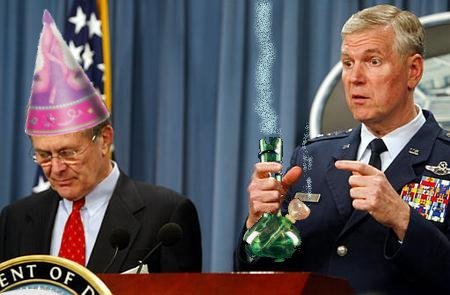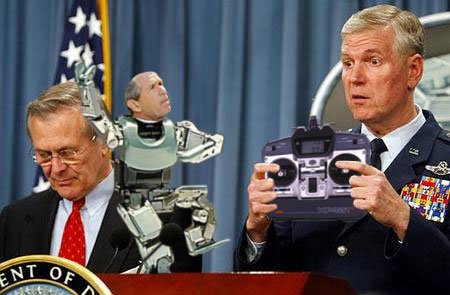The New Right Wing Agenda <
http://www.commondreams.org/views03/0613-02.htm>
by Steven E. Miller
What is going on in Washington? What is the larger agenda behind the amazingly aggressive right wing moves coming from the White House? According to the people I’ve been talking to and the articles I’ve been reading, the right wing agenda has three main points, each of which has precedents in earlier Republican and Democratic Administrations but which have been pushed to a qualitatively new level by the W clique:
1) Fundamentally change the role of government. In the Nation a couple weeks ago, this was described as going back to President McKinley. In other words, stripping government of all social welfare functions and all economic regulatory activity. Instead, government would revert to the sole role of protecting property and sovereignty through the use of its police/military power. This change will be accomplished in all three branches. The judiciary will be stacked, the legislature will pass the appropriate laws, and the executive will become more centralized and autocratic. The transformation of our budget surplus to endless deficits is part of this strategy - instead of having to argue against specific social programs the right-wingers can now simply say that they’re being realistic and dealing honestly with the real lack of funds. Pushing the fiscal crisis down to state and local levels (whose governments are often constitutionally prevented from running deficits) further spreads the transformation and diffuses opponents’ ability to fight back. Those functions that simply cannot be eliminated will be privatized as much as possible. The end result is an authoritarian state whose main function is repression of all institutionalized (and individual) avenues of resistance, perhaps even of dissent, particularly the labor movement.
2) Fundamentally shifting the burden of taxation from capital (including profits and all forms of “unearned” income) to consumption. The eventual goal is to eliminate all capital gains, inheritance, and corporate taxes, as well as the entire income tax. Before that, it means finding ways to exempt as much as possible - starting with those aspects that primarily hit the “investing classes” (i.e. - the rich). Radical and repeated tax cuts help create deficits (re-enforcing the first strategic goal). They also make taxation increasingly regressive, putting ever-larger burdens on working families and the poor. Since this is happening at the same time that services provided by government to those groups are being reduced, it reinforces the traditional anti-tax feeling among the general population - making it easier to push for still more tax cuts and reinforcing the general anti-government feeling that has always been part of American culture.
3) Fundamentally change the nature of international relations from a “trilateral” world in which multinational elites collaborated on creating an investment-friendly world into a US-dominated “new world order” in which narrow nationalist goals are achieved through unilateral and pre-emptive use of the US’s military power and everyone else is forced to accommodate Washington’s ability to “create facts on the ground.” This involves the radical transformation or withering away of many existing multinational organizations and arrangements and the permanent escalation of US military spending (which helps support the other two strategic goals). It plays to the US’s currently dominating military strength while papering over our economic and other weaknesses. It also serves a domestic purpose of evoking knee-jerk nationalism and concern for the soldiers, which distracts attention other issues and makes it very hard to mount an oppositional movement. Acting like a bully also helps create the type of world that justifies the behavior. In the Middle East, Hamas and Sharon need each other to legitimize their own violence as the only viable response to the extremism of the other side. Similarly, by acting in ways that assume the world is full of terrorists, that allies are untrustworthy, that security comes from hitting everyone else before they can hit you, the new imperialists help create the very conditions they claim to be responding to, which then makes it necessary to act even more aggressively.
The most important implication of all this is that large segments of the domestic and world population are no longer seen as worth worrying about. On one level, this is just racism and classism. But there’s more than that going on. In the past, capitalism was optimistic and assumed that it would keep expanding, which provided the basis for a “corporate liberalism” that saw everyone in the world as a potential consumer and/or laborer - and therefore having some potential worth. But the new reactionaries see the future as much more of a zero-sum game. Partly, this is an expression of their incredible greed and corruption - their incessant efforts to rip off wealth for themselves and their narrow sets of cronies. In any case, the result is that most of Africa, large swaths of Latin America and Asia, and significant parts of the domestic US population have been simply written off -individuals who may arise from the trodden mass are welcome as junior partners, but there is no concern at all for the general well being of these sectors beyond token PR and the limited need to keep local elites from causing too much anti-American trouble on the world stage.
The amazing thing is that the right wing fundamentalists have been able to seize power and win a large amount of support - or at least acquiescence -- among the US electorate. The people I talk with point to a number of contextual reasons. First, this country lacks any significant institutionalized alternative. The Democratic Party is both complicit and fratricidal. The labor movement is the only really powerful potential organized opposition, but they are ideologically scattered, organizationally weak, and under unremitting attack. In addition, the powerful role of money in shaping our electoral outcomes is another key ingredient in the right wings success, as well as in keeping liberal (much less radical) alternatives from gaining influence in the Democratic Party. The increasing dominance of US media by an incredibly small number of incredibly right wing corporations has a powerful impact. The collapse of the Soviet Union, the lack of any significant “third way,” and the resulting feeling that there is “no viable alternative” has been a very important context for the right wings’ ability to present themselves as inevitable and unstoppable. Finally, the current climate of insecurity, fear, and even paranoia - which the government and media are successfully doing their utmost to deepen and expand - plays an important role in making it hard to opposition to find political space.
Using all these institutional-cultural supports, the reactionary clique has built a broad and powerful coalition. They’ve become a “big tent” for anti-abortionists (pulling in the Catholic right wing), anti-feminists (attracting not only status-concerned men but women who feel threatened by the loss of the “security and respect” given to traditional female roles), homophobes, anti-immigrant and anti-affirmative action groups (drawing on the racist undercurrents that always rise during periods of uncertainty, unrest, and change), gun advocates (pulling in huge numbers of rural and western voters), property-rights advocates (dipping into the traditional distrust of government bureaucracy), business advocates (offering a path forward to businesses increasingly pressed by foreign competition during an economic downturn), and more. And they’ve found ways to give everyone of these constituent groups immediate monetary, policy, and cultural-symbolic payoffs - further tightening their bonds to the government clique.
Most important, by wrapping themselves in the mantle of religion, the GOP leadership has made themselves a vehicle for the growing religious fundamentalist upsurge - parts of which can accurately be described as a fascist movement. Having god on your side means you are always right, no matter what other people may think or how events may fall out. You simply never have to say you are sorry, and all your failures are the result of evil forces beyond your control. Being on a Crusade, having an absolutist and deeply ideological sense of mission, also underpins the right wing’s willingness to use all the power at their command - legal and extra-legal - to push for a maximal agenda. No matter how thin their electoral margin of victory, once in office, they act without hesitation or compromise. They understand that success creates its own legitimacy and its own tailwind, pulling others along with it.
The scariest part is that the right wing lunatics feel that they’ll get away with it. Who remembers Afghanistan, or the absence of Iraqi’s supposed weapons of mass destruction? Who seems to care that our economy is collapsing? In the short term, Bush and company win not because of smarter strategies or brilliant tactics, but because they have access to overwhelming resources and power and they can simply outlast everyone and everything else. In fact, they are so incompetent and so blind to the complexities of the real world that they will make huge mistakes. So it is possible (but not inevitable) that the world situation will spin out of control and the small clique now running the country will have to pass the baton to others in 2004 or 2008. But we should not underestimate their willingness to keep imposing their will through direct (or indirect) force -- the racism, lies, manipulation, and violence used to secure the 2000 election are likely to be repeated or exceeded in coming years.
In any case, while I believe that whoever replaces Bush - either in the next election or in the one afterwards, either Republican or Democrat - will moderate W’s most extreme and obviously counterproductive actions, they are very unlikely to want or be able to reverse all the fundamental changes that he (as the culmination of a process that started with Ronald Reagan, or perhaps even earlier with Scoop Jackson) has so successfully pushed forward. Even if they wanted to go back to the pre-Bush status quo - which wasn’t so wonderful anyway - in politics, as in life, you can never go back. They will have to make their way forward using the “new world order” as their starting point. Already, European leaders who opposed the US invasion of Iraq are making their peace with the reality that the US went ahead anyway and with the overall agenda of which it is merely one expression.
We’re in for a long fight. We can’t pretend that merely exposing the power elite’s wrong doings or failures will cause their downfall. To survive, we need to find issues and movements that can provide some safe space, that uphold a different world view while not denying the new reality in which we live, that can win some concrete and meaningful small victories (which will require some new strategies) while projecting a vision of a more significant change. I think we’ll be dealing with defensive steps for a while to come. But if we’re lucky, we can keep a bit of the progressive spirit alive as kindling for the next wave of upsurge. And the bigger the oppositional movement we build the more likely we are to see significant changes. You never know…sometimes things change much quicker than we anticipate.
Steven E. Miller (
[email protected]) was the former Board Chair of Grassroots International, a progressive international development and solidarity organization. He was also on the national board of Computer Professionals for Social Responsibility (CPSR). A former community organizer, teacher, and journalist, he currently leads a small non-profit that helps schools integrate technology into the curriculum.













